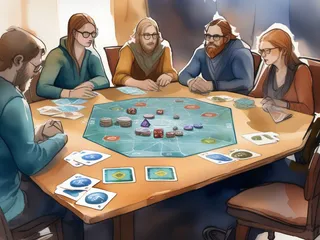It's no secret that I am not a sports person. I don't follow football, baseball, basketball, or any of the major leagues. My idea of athleticism is walking briskly to the coffee shop without getting winded. So when I first heard about Ted Lasso, I was skeptical. But, I gave it a shot. And when Ted Lasso first walked into that Richmond AFC locker room with his signature mustache and relentless optimism, I had no idea I was watching a masterclass in servant leadership. Sure, he knew nothing about football (nor did I), but he knew everything about people.
I've just finished rewatching the series for the third time, and each viewing reveals another parallel between coaching a struggling team and facilitating a development team. Turns out, "Believe" isn't just a cute sign above a doorway — it's a whole leadership philosophy.
Beware: spoilers ahead for Ted Lasso seasons one through three.
Curiosity Over Competence
Be curious, not judgmental. — Ted Lasso (via Walt Whitman)
Ted drops this Walt Whitman quote during a pivotal dart game, and it might be the most Scrum Master thing ever said on television.
Ted arrives in England knowing absolutely nothing about soccer. He doesn't pretend otherwise. He doesn't bluff his way through tactical discussions or fake expertise he doesn't have. Instead, he asks questions. Lots of them. He's genuinely curious about the game, the culture, and most importantly, the people.
This resonates hard. How many times have you walked into a sprint planning session where the team is discussing technical architecture you don't fully understand? The temptation to nod along and pretend you get it is real. But Ted's approach is better; ask the "dumb" questions. "Help me understand why we're choosing this approach." "What problem does this solve for our users?" "Walk me through how this works."
Your job isn't to be the smartest person in the room about the technical work. It's to understand the people doing the work, remove their impediments, and help them work better together. Ted relies on assistants Beard and Nate on tactics. A good Scrum Master leans on their developers for technical guidance while focusing on team dynamics, process improvement, and organizational impediments.
The dart game scene demonstrates another crucial point — Ted had been observing and learning the whole time. He wasn't passively ignorant; he was actively curious. When Rupert assumes Ted knows nothing (classic judging, not curiosity), Ted's prepared. Similarly, even when you're not the technical expert, your observations about team patterns, communication breakdowns, or process inefficiencies are valuable precisely because you're paying attention to different things.
Psychological Safety Isn't Soft — It's Essential
I think that you might be so sure that you're one in a million, that sometimes you forget that out there, you're just one of eleven. — Ted to Jamie Tartt
Ted builds psychological safety from day one. He learns everyone's names. He puts up that "Believe" sign. He brings biscuits to Rebecca. He creates an environment where it's safe to be yourself, make mistakes, and grow.
When Jamie Tartt is being a selfish glory-hound, Ted doesn't bench him or tear him down publicly. He has a private conversation. When Roy Kent is struggling with aging out of his career, Ted creates space for him to process those feelings. When Sam is dealing with personal and political issues, Ted listens without trying to fix everything immediately.
This is textbook Scrum Master behavior. Your daily standups should feel safe enough that people can say, "I'm blocked and I don't know how to solve this," without fear. Your retrospectives should allow genuine reflection, not just surface-level observations designed to avoid rocking the boat.
The episode where Ted has a panic attack during a match is powerful for multiple reasons. First, it shows that even Ted — the eternal optimist, the culture-builder, the guy who seems to have it all figured out — struggles. But here's what makes it really instructive: Ted initially resists therapy. Hard.
When Dr. Sharon Fieldstone arrives, Ted treats her with polite distance bordering on hostility. He makes jokes to deflect. He questions whether therapy is really necessary. This is toxic masculinity in its subtlest form — not aggressive or overt, but the quiet insistence that asking for help means you're not strong enough, that real leaders handle things on their own, that vulnerability is weakness dressed up as self-awareness.
Sound familiar? How many times have you seen talented developers burn out rather than admit they're overwhelmed? How often have you watched team members struggle in silence because asking for help feels like admitting failure? Ted's initial resistance to therapy mirrors the same pattern we see constantly in tech culture.
But Ted learns. Slowly, uncomfortably, he opens up to Dr. Sharon. He admits he's not okay. He does the work. And critically, he doesn't hide this journey from his team. When Nate later betrays him by leaking the panic attacks to the press, Ted doesn't spiral into shame or denial. He's already done the hard work of accepting his own humanity.
The team's response tells you everything about the culture Ted built. They rally around him. They already knew he was human — that's why they trusted him. His willingness to be vulnerable, to try something uncomfortable (therapy), to admit he doesn't have all the answers, actually strengthens his leadership.
This is the lesson: psychological safety starts with you. If you want your team to admit when they're blocked, you need to model asking for help. If you want them to try new approaches even when they're uncertain, you need to show them it's okay to be uncertain. Ted preaches curiosity and growth, but it's his willingness to actually be curious about his own struggles and grow from them that makes the difference.
The Power of Small Rituals
I do love a locker room. It smells like potential. — Ted Lasso
Ted creates rituals everywhere. The biscuits for Rebecca. The team chant before matches. The movie nights. These aren't arbitrary team-building exercises — they're intentional culture-building moments.
Scrum is built on rituals: daily standups, sprint planning, retrospectives, reviews. But how many of us let these ceremonies become stale? How often does your standup feel like a status report to management instead of a genuine team sync?
Ted would never let that happen. Watch how he runs team meetings. There's always a purpose, always engagement, always something that brings the group together. When he has the team play "Total Football" without positions, it's not just a drill — it's a metaphor for collaboration and trust.
Your sprint ceremonies should feel meaningful. If your team is going through the motions, something's broken. Maybe your retrospectives need a format shake-up. Maybe your standups need to happen at a different time, or in a different way. Maybe you need to establish new rituals that actually resonate with your specific team culture.
The "Believe" sign works because Ted doesn't just hang it and forget it. He references it. He embodies it. He makes it mean something. Your team's working agreements shouldn't be a document that lives in Confluence gathering dust. They should be living principles that guide real decisions.
Coaching the Individual, Not Just the Team
All people are different people. — Ted Lasso
Ted's greatest strength is seeing people as individuals. He doesn't have one coaching style he applies to everyone. His approach with Roy is different from his approach with Jamie, which is different from his approach with Sam, Isaac, or Dani Rojas.
Roy needs someone to give him permission to evolve beyond who he was. Jamie needs to learn he can be brilliant without being selfish. Sam needs space to find his voice on issues beyond football. Isaac needs confidence to step into leadership. Dani needs help processing trauma after his penalty kick injury.
Ted adjusts his coaching to each person's needs. He doesn't force Roy to be optimistic or Jamie to be humble through some one-size-fits-all leadership program. He meets each player where they are.
This is harder than it sounds in a Scrum context. You've got developers at different experience levels, with different communication styles, different career goals, and different challenges. The junior developer struggling with imposter syndrome needs different support than the senior developer dealing with burnout. The introverted engineer who does their best thinking alone needs different facilitation than the extrovert who thinks out loud in meetings.
Pay attention to the individuals. Not in a creepy surveillance way, but in a genuine "I see you as a person" way. Notice when someone's energy is off. Check in when someone's usually vocal but has gone quiet. Celebrate personal wins, not just sprint goals.
Ego Is the Enemy of Progress
Taking on a challenge is a lot like riding a horse, isn't it? If you're comfortable while you're doing it, you're probably doing it wrong. — Ted Lasso
Ted's ego never gets in the way of the team's success. When Beard has a better tactical idea, Ted listens. When Nate starts contributing strategy, Ted amplifies it and gives him credit. When Roy needs to take over as coach while Ted steps back, Ted doesn't cling to control.
Compare this to Rebecca's ex-husband Rupert, who needs to be the center of attention, or Jamie in season one, who plays for personal glory instead of team success. Their egos actively harm the people around them.
In Scrum Master terms: you're a servant leader, not a project manager. Your job is to make the team successful, not to be seen as the reason they're successful. If your team is self-organizing beautifully and you're barely needed in standups? That's a win, not a threat to your relevance.
I've seen Scrum Masters who need to be involved in every decision, who interrupt team problem-solving to insert their own solutions, who take credit for team successes. That's not servant leadership. That's ego.
Ted celebrates when Nathan's tactics work. He's genuinely thrilled when Roy becomes a better coach. He doesn't see their success as competition — he sees it as proof the culture is working. When your developers start facilitating their own technical discussions without needing you to moderate, that's not you becoming obsolete. That's you succeeding at building a self-organizing team.
Conflict Is Opportunity in Disguise
I shouldn't have done that. I'm sorry. — Roy Kent (after headbutting Jamie)
Ted Lasso doesn't shy away from conflict — he walks directly into it with empathy and honesty. When Roy and Jamie have their explosive confrontation, Ted doesn't pretend it didn't happen or punish them into compliance. He creates space for resolution.
The episode where the team is "Anonymous Source" tattling to the press shows Ted at his best. Instead of going on a witch hunt, he addresses the root cause — lack of trust. He doesn't force fake harmony; he acknowledges the dysfunction and works through it.
In your retrospectives, are you avoiding the hard conversations? When there's tension between frontend and backend teams, or when someone's consistently missing commitments, or when architectural decisions are creating friction — do you facilitate those discussions or route around them?
Healthy conflict leads to better solutions. Ted knows this. When Roy and Jamie finally work through their issues, they both become better players and the team chemistry improves. When your team has genuine, respectful debates about technical approaches, that's not dysfunction — that's high-performing team behavior.
The key is creating the container where conflict can be productive. Ted does this through consistent culture-building. People trust that disagreement won't result in retaliation or exclusion. They know they can say, "I think this approach is wrong," without it becoming personal.
Patience With the Process
I believe in hope. I believe in belief. — Ted Lasso
Ted gets relegated. He loses, badly, repeatedly. The press mocks him. The fans turn on him. Rebecca actively sabotages him (at first). And through it all, he maintains belief in the process and the people.
Season one ends with Richmond getting relegated to a lower league. Ted treats it as a learning opportunity, not a failure. Season two shows the patient work of rebuilding — not just winning, but building something sustainable.
This patience is critical for Scrum Masters. Your team isn't going to transform overnight. That first retrospective where you introduce new formats might feel awkward. The shift from doing agile to being agile takes time. Trust the process.
I've been on teams where leadership wanted immediate results from "implementing Scrum." They wanted velocity increases in the first sprint, seamless self-organization after one planning session, and flawless predictability right away. That's not how culture change works.
Ted would never expect Richmond to win the Premier League in their first season (though they make a good run at it in season three). He knows you build the culture, develop the players, refine the tactics, and trust that results follow. Similarly, you can't force team maturity. You create the conditions for growth and stay patient with the timeline.
When the team ties their first match after a long losing streak, Ted celebrates like they won the championship. Small wins matter. Sprint over sprint improvements matter. That retrospective where someone finally felt safe enough to raise a real issue? That's progress, even if the issue hasn't been solved yet.
Lead With Kindness, Not Niceness
Be a goldfish. — Ted Lasso
There's a crucial distinction between Ted's kindness and simple niceness. He's not a pushover. He benches Jamie when Jamie won't play for the team. He lets Roy sit with his anger instead of forcing premature positivity. He fires Nate's replacement immediately when the guy shows his true colors.
Ted is kind, which means he does what's best for people even when it's uncomfortable. Nice people avoid conflict and difficult conversations. Kind people have those conversations because they care about growth.
When Nate betrays Ted and the team, Ted's response is heartbreaking but measured. He's hurt, but he still sees Nate as a person who's struggling, not as a villain. Later, when Nate wants to return, Ted doesn't make him grovel — but the reconciliation is earned, not automatic.
As a Scrum Master, you'll face situations where kindness means having hard conversations. That developer who dominates every meeting and talks over others? Kindness means private feedback, not letting it continue because confrontation feels mean. That product owner who keeps changing scope mid-sprint? Kindness to your team means enforcing boundaries.
"Be a goldfish" — Ted's advice to Sam about having a short memory after mistakes — isn't about ignoring problems. It's about not letting one mistake define you or derail progress. When your team misses a sprint commitment, you do a retrospective to understand why. But you don't carry that "failure" into the next sprint as baggage. You learn and move forward.
Trust the Experts Around You
I am a strong, independent woman — and I do not need you or anyone else fighting my battles for me. — Keeley Jones
Ted surrounds himself with people who know more than he does and then — crucially — he listens to them. Beard knows tactics. Keeley knows PR and media. Rebecca knows business. Higgins knows organizational politics. Ted doesn't pretend to have all the answers. He builds a brain trust and trusts it.
When Ted needs help with his panic attacks, he goes to Sharon, the therapist. He doesn't try to power through alone. When Richmond needs better training methods, he brings in specialists. When the team needs tactical adjustments, he defers to Beard and Roy.
Your development team knows the code better than you do. Your product owner should know the market and users better than you do. Your stakeholders know the business context better than you do. Part of being an effective Scrum Master is orchestrating all that expertise, not trying to replace it.
I've made this mistake. Early in my Scrum Master journey, I thought I needed to have answers to everything. Someone asks about test coverage? I should know. Questions about deployment pipelines? Better have an opinion. Debates about architecture? Time to weigh in.
No. Ted's got it right. Ask the experts. Facilitate the conversation. Make sure all voices are heard. But don't pretend you're the source of all wisdom. The team is.
Make the Tough Calls
Fairytales do not start, nor do they end, in the dark forest. That’s something that only shows up smack dab in the middle of a story. But it will all work out. — Ted Lasso
For all his optimism and kindness, Ted makes hard decisions when needed. He benches players who aren't performing. He has difficult conversations with Rebecca about her sabotage. He lets Roy Kent figure things out instead of rescuing him. He allows Jamie to leave when it's best for him and the team.
These aren't comfortable decisions. Ted doesn't enjoy conflict. But he doesn't avoid it when the team needs him to act.
As a Scrum Master, you'll face tough calls. Maybe someone isn't a good fit for the team and needs to move to a different project. Maybe a stakeholder relationship is toxic and you need to escalate. Maybe your sprint ceremonies have become so dysfunctional that you need to reset completely, which will be uncomfortable for everyone.
Ted's example shows you can make these decisions with empathy and still maintain relationships. When Jamie returns, Ted doesn't hold a grudge — the situation changed, Jamie grew, and now he fits. When Ted confronts Rebecca about trying to sabotage the team, he's honest but not cruel.
The comfortable path is rarely the right path when you're facilitating change. If every decision you make is easy and popular, you're probably not pushing hard enough on the real impediments.
Build Something That Outlasts You
Divorce is hard. It doesn't matter if you're the one who gets left, or the one who does the leaving. — Ted Lasso
The final season shows Ted building something that can succeed without him. He develops Roy and Beard as coaches. He empowers the players to lead themselves. When Ted eventually returns to Kansas, Richmond doesn't collapse — because the culture he built wasn't dependent on him being there.
This is the ultimate goal of servant leadership. You're not building a team that needs you to function. You're building a team that's better because you were there, but can thrive when you're not.
In practical terms: are you the single point of failure for your team? If you took a three-week vacation, would everything fall apart? If you moved to a different project, would the team's Scrum practices regress immediately?
If yes, you've built dependency, not capability. Ted builds capability. He teaches people to coach themselves. He creates systems and culture that persist. The "Believe" sign stays up because the team believes it, not because Ted enforces it.
A good mentor hopes you will move on. A great mentor knows you will - Leslie Higgans
Work yourself out of a job. Not literally — though that might happen — but philosophically. Your success is measured by how little the team needs you to function day-to-day, not how indispensable you are.
The Long Game Always Wins
I haven't given up on us. I'm just waiting for us to be ready. — Mae (the pub owner)
Ted plays the long game. He doesn't panic after losses. He doesn't make rash decisions under pressure. He trusts that consistent, values-driven leadership compounds over time.
The first season ends with relegation — arguably a disaster. But Ted sees it as the foundation for something better. Season two is about building that foundation properly. Season three shows the payoff. Richmond's success in the final season isn't luck or talent alone — it's the result of three years of culture-building, player development, and staying true to the process.
Sprint velocity matters less than sustainable pace. That feature you rushed out to hit an arbitrary deadline but created technical debt? That's short-term thinking. The refactoring effort that doesn't produce visible features but makes future development faster and more stable? That's long-term thinking.
Ted would rather have a cohesive team that improves steadily than a group of superstars who can't work together. He'd rather develop Dani Rojas and Sam Obisanya into better players than just buy expensive talent. He invests in people.
Your job is often to be the voice of sustainability when everyone else is optimizing for the current sprint. To protect team health when stakeholders want impossible commitments. To invest in practices that pay dividends later, even if they slow things down now.
Believe
Doing the right thing is never the wrong thing. — Ted Lasso
"Believe" isn't just a sign. It's not toxic positivity or naive optimism. In Ted's hands, it's a philosophical stance: believe in people, believe in the process, believe that things can get better even when they're bad.
When everything's falling apart — and in both Ted Lasso and software development, everything falls apart regularly — belief is what keeps you moving forward. Not belief that everything will magically work out, but belief that the work you're doing matters and that incremental progress compounds.
Ted believes Rebecca can become a better owner. He believes Jamie can grow beyond his ego. He believes Nate can find his confidence. He believes Roy can evolve past his playing career. And because he believes in them, they start believing in themselves.
Your team is watching you in the same way Richmond watches Ted. When a sprint goes sideways, do you panic or do you facilitate a calm retrospective? When stakeholders are demanding the impossible, do you fold immediately or do you advocate for sustainable pace? When someone makes a mistake, do you create space for growth or assign blame?
You don't have to be relentlessly cheerful like Ted (and honestly, neither is he beneath the surface). But you do need to genuinely believe in the people you're serving. Believe they can self-organize. Believe they can solve complex problems. Believe they can grow and improve. Because if you don't believe in them, why should they believe in themselves?
The Biscuit Approach to Servant Leadership
Human beings are never gonna be perfect. The best we can do is to keep asking for help and accepting it when you can. And if you keep on doing that, you’ll always be moving towards better. — Leslie Higgans
I can't write about Ted Lasso without mentioning the biscuits. Every morning, Ted brings Rebecca shortbread in a pink box. It's a small gesture, but it's consistent, thoughtful, and it eventually breaks through her walls.
The biscuits aren't about grand gestures or forced team-building. They're about showing up consistently with small acts of consideration. They're about noticing what someone values (Rebecca loves those biscuits) and making the effort.
What's your version of the biscuits? Maybe it's remembering that one developer takes their kids to school and scheduling standups later. Maybe it's noticing someone did great work and calling it out specifically. Maybe it's bringing documentation to a meeting because you know one team member processes information better in writing.
Servant leadership isn't about heroic interventions. It's about consistent, genuine care for the people you work with. It's showing up every day and doing small things that make their work lives better.
Ted never stops bringing those biscuits, even when Rebecca is actively trying to sabotage him. He doesn't make them transactional. He doesn't withhold them when he's frustrated. The consistency is the point.
Your team needs that same consistency. They need to know you'll be there at standup, that you'll follow up on impediments, that you'll create space for retrospective discussions, that you'll advocate for them when stakeholders are unreasonable. Not just when you feel like it, but every sprint, every day.
Being a Scrum Master isn't comfortable. Servant leadership isn't comfortable. Building real team culture isn't comfortable.
But Ted shows us it's worth it. Not just for the wins — though Richmond does eventually succeed — but for the people you develop, the culture you build, and the lasting impact you create.
You don't need a folksy accent or an arsenal of dad jokes (though they don't hurt). You don't need to be relentlessly positive or pretend everything's fine when it's not. You just need to care genuinely about the people you serve, stay curious instead of judgmental, and believe that small, consistent actions compound into meaningful change.





